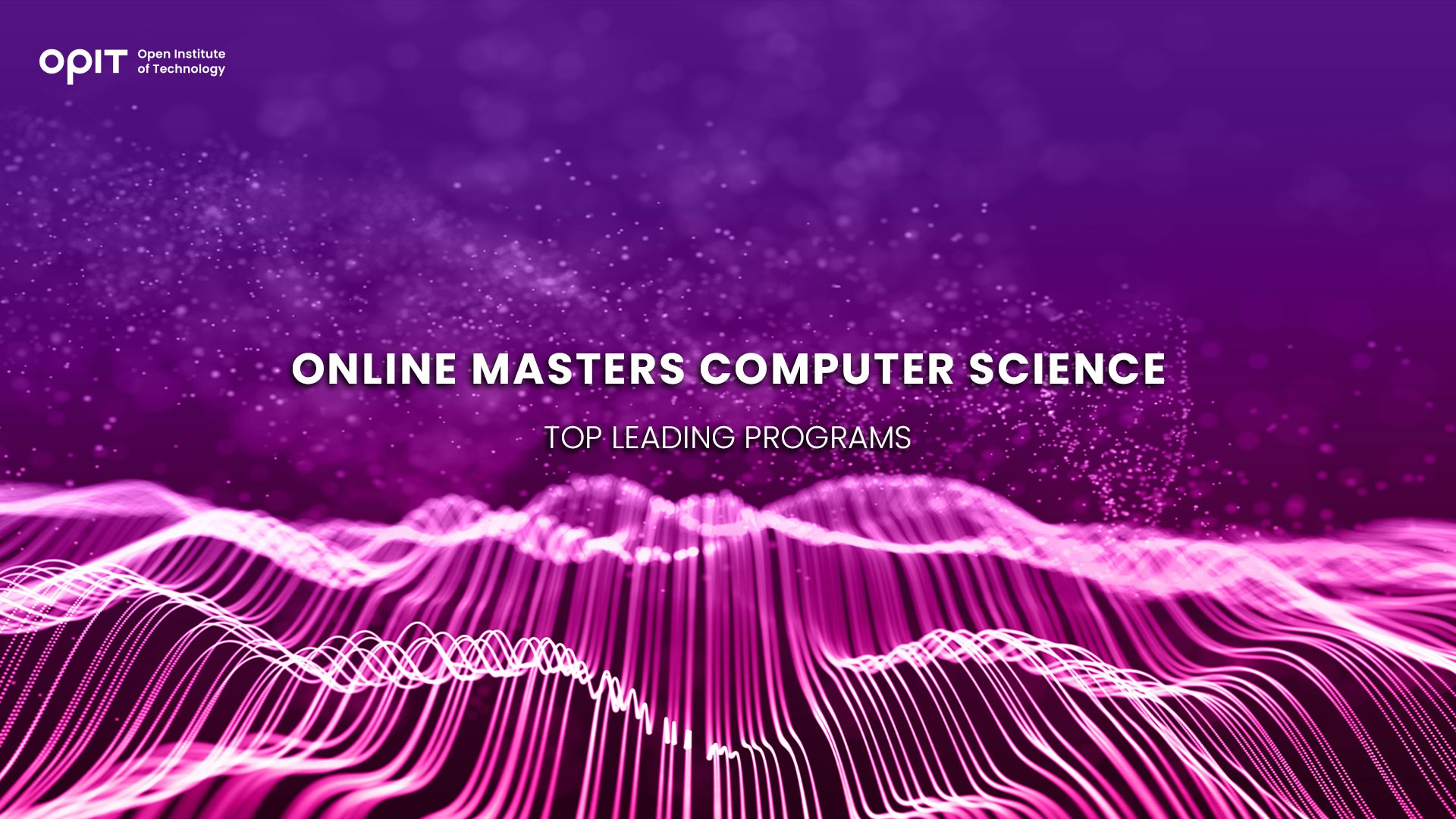

You’d be hard-pressed to find a more rapidly evolving industry than computer science today. It seems like new solutions and applications in the field pop up every day, and the market has never been hungrier for talent.
If you’re interested in computer science, you’re in luck. This industry has some of the best-paid jobs worldwide and is full of exciting developments and novel challenges. Of course, many people are competing for those work positions, which is why you must do everything in your power to gain an advantage.
With an online masters computer science program, you can get the edge over other candidates in the market. Completing such a program will provide you with cutting-edge knowledge and equip you with the most relevant skills. In other words, an online MSc computer science program may help you start a career in the field.
But choosing the best online masters computer science program may be more complex than it seems. Numerous institutions offer this type of education, so finding the top options among the crowd could be a challenge.
This article will serve as your complete guide to online masters computer science programs. We’ll explain what to look for, recommend some of the leading options, tell you how to apply, and outline what awaits once you graduate.
Factors to Consider When Choosing an Online Masters in Computer Science Program
It goes without saying that you shouldn’t enroll in a master’s program without closely examining your options. Be sure to pay attention to specific criteria when considering where you’ll get your online MSc computer science degree:
- Accreditation: You’ll want to graduate at an accredited institution with degrees that are recognized worldwide. Other universities and employers won’t consider unaccredited degrees particularly valuable or trustworthy. Plus, accreditation serves as proof that an educational institution meets certain international standards.
- Curriculum and specializations: Your choice of an online masters computer science program will depend on the classes provided. The curriculum should be appropriate for your purposes and goals. And since computer science is a broad field, you’ll want to ensure the program has the right specialization options for you.
- Faculty expertise: A master’s program will often be only as efficient as the people teaching it. Faculty members at your program of choice should, of course, be experts. They should also have extensive experience to provide practical guidance and show you how computer science is applied in real-life.
- Program format and flexibility: Online programs have the major advantage of not requiring you to physically attend classes. This means that a certain level of flexibility is expected, both in terms of day-to-day lectures and deadlines. The flexibility principle often extends to the curriculum itself, with many programs offering a large number of electives.
- Tuition fees and financial aid: Considering the tuition price is always worthwhile. Like everything else in the market, master’s programs can be under- or overpriced. You should take care that you’re getting the right value for a reasonable sum. Plus, there are usually financial aid options available to help soften the financial impact.
- Student support services: Lastly, the best online masters computer science programs will offer extensive support to students. This can represent a massive benefit when you need counseling or extra guidance. Even better, your program might include career support, nurturing you from student to graduate to employee.
Top Online Masters in Computer Science Programs
1. International University of Applied Sciences (IU) – Master’s in Computer Science
This program offers practical education in computer science. Focusing mostly on artificial intelligence, cybersecurity, and data science, it lasts between two and four years, depending on whether you study full or part-time.
Key Features:
- Dual degree option available
- Accredited according to European standards
- Entirely flexible
To enter this program, you’ll need to provide a computer science-focused undergraduate degree from a recognized institution. English proficiency will also be mandatory. The monthly tuition fee is €278 for full-time, €209 for part-time (three years), and €165 for part-time (four years) students.
2. University of Essex – MSc Computer Science
This two-year program by the University of Essex starts by examining the theoretical fundamentals. Then, it allows you to choose a specific field of focus and study it in detail through lectures and practical applications.
Key Features:
- BCS accreditation
- Tuition fee covers learning tools like programming languages
- Suitable for students from a different background
You can apply for this program with an undergraduate degree or if you’ve worked in a relevant field for a minimum of three years. English language qualification is acceptable from IELTS or a similar school. If lacking such qualifications, the University of Essex also lets you take a free online test. The tuition fees are £12,167 for UK and £12,428 for international students with possibilities of scholarships and discounts.
3. MIA Digital University – Master in Computer Science – Cybersecurity, Data Analytics, and Artificial Intelligence
Based in Barcelona, Spain, the MIA Digital University offers a computer science program that tackles some of the most requested profiles in the industry. You’ll learn about the latest developments in cybersecurity, data analytics, and AI, as well as how to apply them in practice. The program lasts for one year.
Key Features:
- Dual degree with Universidad a Distancia de Madrid (Udima)
- Student internships offered
- Heavily project-based
Application for this program will require a previous degree, which doesn’t have to be from the computer science field. You’ll also need to submit a resume or CV and a valid ID. The price of the program is €3,900, with scholarships available.
4. BTH Sweden – Master’s Program in Software Engineering
Somewhat more specific than other programs on the list, this MSc focuses on software engineering. However, the program also leans heavily into data science, machine learning, and AI. For that reason, you may view it as a computer science program with an emphasis on software engineering. The program is two years long.
Key Features:
- Mixed-time structure
- Work in groups and individually
- Based on leading software engineering research
To apply for this program, you’ll need a BSc degree in Engineering with a minimum 15-credit degree project. Professional experience of no less than two years in software development is also required, preferably with programming involved. The program doesn’t have a tuition fee for UK students, while others will need to pay SEK 60,000 for each semester.
How to Apply for an Online Masters in Computer Science Program
Precisely how you apply for an online masters computer science program will depend on the institution. There’s no universal application process, but you can keep certain guidelines in mind.
First, get detailed information about the requirements. Most master’s programs will require previous education in the field, although some may accept provable work experience instead of a degree.
Certain programs will also ask for a letter of recommendation and statement of purpose. But even if these documents aren’t requested, including them in your application will usually be a plus. Also, online MSc computer science programs are commonly held in English, so you’ll need a level of language proficiency and the appropriate certification.
Learning all of the relevant information in time and getting your documents in order will be pivotal. The last thing you’d want to do is miss out on a program by submitting an incomplete application. Additionally, you’ll have the greatest chances of success if you apply for a program with requirements you’re certain you’ll meet.
Every program will have specified deadlines and dates for application, interviews, covering the fees, and enrollment. Naturally, missing those dates would likely result in you not being accepted, so do your best to stay on track.
Career Prospects for Graduates of Online Masters in Computer Science Programs
Computer science graduates have plenty of options in the job market. Experts in this field are needed in various industries, including finance, IT, healthcare, and commerce.
Depending on your specialization, you could work in programming, database management, cybersecurity, robotics, network engineering, etc. The average base yearly salary for a computer science MSc graduate is €56,000. Of course, this will vary widely depending on your field of expertise, industry, and experience.
Your online masters computer science degree will also allow you to continue your education. You can move forward to different specializations, either in a particular field or interdisciplinary. In addition, an MSc may make you eligible for a PhD program, if you’re interested in further academic progress.
Complete an Online MSc Computer Science Program and Start a Rewarding Career
Choosing an online MSc computer science program that fits your goals can be an immensely valuable career and educational move. This degree will give you an advantage in the job market and help you hone your professional skills. Plus, enrolling in a postgraduate program will create networking opportunities that may be of great importance.
If getting an MSc in computer science sounds enticing, there’s no reason not to start working on it right now. Research the programs that suit your needs and don’t hesitate to apply. You’ll be making a worthwhile step in the right direction.
Have questions?
Visit our FAQ page or get in touch with us!
Write us at +39 335 576 0263
Get in touch at hello@opit.com
Talk to one of our Study Advisors
We are international
We can speak in:




